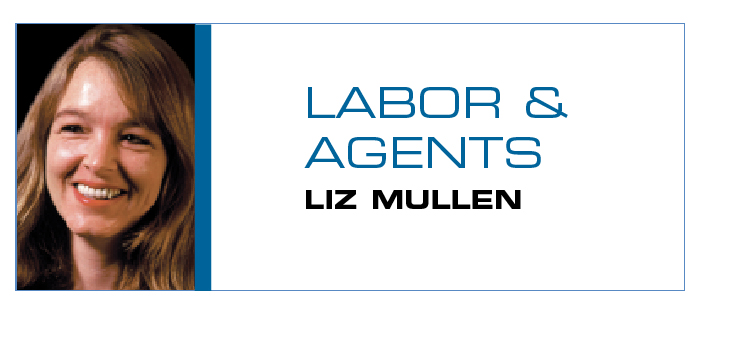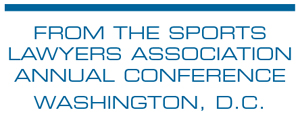As the rhetoric surrounding the NFL and NBA labor situations continues to ratchet up, negotiators for MLB and the MLB Players Association have been quietly working to get a new collective-bargaining agreement of their own completed by the end of the year.
MLBPA Executive Director Michael Weiner, in a speech before the Sports Lawyers Association in Washington, D.C., said people in sports have been asking him the same question these days.
“I get asked a lot, ‘Why is it going more smoothly in baseball than the other sports?’” Weiner said.
The NFL locked out players March 12 after the expiration of that league’s CBA. The NBA is negotiating with the National Basketball Players Association, but with the two sides far apart, the league may lock out players when its CBA expires June 30.
While the NFL and NBA labor disputes have attracted media scrutiny, the fact that Major League Baseball, a sport with a history of lockouts and strikes, is negotiating a new deal has drawn little press attention. So little, in fact, that Weiner began his speech before the annual sports attorneys conference with a joke.
“I understand there are some members of the press here, so I thought I should try to say something newsworthy,” Weiner said. “Our collective-bargaining agreement actually expires this year.”
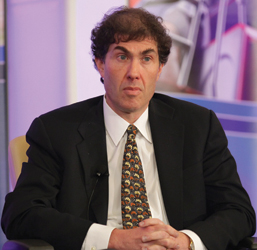 |
GORT PRODUCTIONS
The MLBPA’s Weiner says NFL, NBA owners believe they have power to get concessions. |
The MLB CBA expires Dec. 11. The reason the negotiations have not been front-page news is the widespread expectation that MLB and the players will reach a settlement without a strike or lockout. Unlike the owners in the NBA and NFL, MLB owners are not seeking significant concessions.
In his speech, Weiner said that the NFL, which acknowledges it is profitable, was asking for about $1 billion back from the players while the NBA, which says it is losing money, was asking for close to that same amount.
“Why is it that these two leagues, one of them making money, one of them claiming to lose money, are essentially asking for the same thing?” Weiner said. “It’s not because of economic imperatives. It’s because they think they can get it.”
The NFL declined to comment on Weiner’s remarks. The NBA did not respond to an email seeking comment.
Weiner said collective bargaining is not about intelligence or creativity or the personalities involved in the negotiations. Instead, he said, collective bargaining is about one thing: power. He said he thinks that is what is driving NBA and NFL owners.
“It’s because their assessment — wrong, I believe — their assessment is that they think they have the power,” Weiner said. “They are asking for huge, huge concessions from those players.”
“Why aren’t the baseball owners seeking those kinds of concessions?” Weiner said. “I don’t think it’s because the baseball owners like money less than football and basketball owners.”
Weiner said the reason MLB owners are not seeking the same level of concessions from baseball players is the history of the MLBPA and the unity of baseball players.
MLB owners would love to have the kind of shift in revenue from players to owners that NFL and NBA owners are seeking, Weiner said, “[but] they don’t think they can get there without a fight that would so damage the industry and so damage the game. That is not worth it.”
Weiner noted that MLB players’ gains did not magically appear or drop from the sky. “[Baseball players] fought the very kind of battles that football players and basketball players are fighting,” he said, “and they have to fight this year.”
NHL CBA TALKS TARGET 2012: While MLB, the NFL and the NBA all face expiring, or expired, CBAs this year, the NHL’s CBA does not expire until September 2012. NHL Deputy Commissioner Bill Daly, speaking before the Sports Lawyers Association said, “I don’t expect we will be in substantive discussions for a new collective-bargaining agreement at least until the new calendar year.”
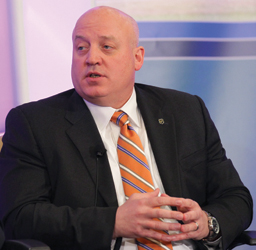 |
GORT PRODUCTIONS
The NHL’s Daly doesn’t expect hockey talks to begin in earnest until next year. |
Daly noted that the NHL Players’ Association, which has fired three executive directors since the yearlong NHL lockout that ended in 2005, last year elected longtime MLBPA Executive Director
Don Fehr as head of the hockey players union.
“Obviously we have been working for several months with Don and his staff to establish a good working relationship,” Daly said. “As we go forward, I think he is in a process of evaluating and building his organization, understanding the relationships in hockey, understanding the wants and the needs of the players, [and] understanding a little better how our system works since it’s not a system he has had much familiarity with.”
Fehr, who has spoken many times at SLA, did not do so this year because he was attending the funeral of New York Rangers left winger Derek Boogaard, who died May 13.
A union source, in response to Daly’s comments, said, “The NHLPA has not yet discussed with the players the specific timing of beginning CBA talks with the league.” This source said the players will discuss it during player meetings this summer, as well as during Fehr’s annual fall tour.
It is not known whether the negotiations for a new NHL CBA will be contentious, but it’s no secret that NHL players were not happy with the escrow system that is part of the current CBA. As part of that system, the NHL withholds a percentage of players’ paychecks and then returns a certain amount depending on revenue. The system is meant to guarantee that players receive exactly 57 percent of hockey-related revenue.
Players are expected to get some money back this year, as NHL revenue is expected to increase by more than $200 million from last year, to nearly $3 billion for the 2010-11 season. Daly said the escrow was about 17 percent for the first two quarters of the season, 10.5 percent in the third quarter and 9 percent in the last quarter. “Now we are looking at an effective withhold rate of under 5 percent this year,” Daly said.
EYES ON THE NFL: Many of the speakers at the SLA conference talked about — and sometimes argued about — the NFL lockout, the antitrust cases brought against the league by players and what might happen in court-ordered mediation.
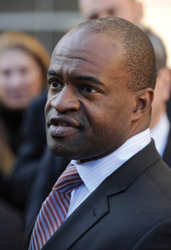 |
GETTY IMAGES
The NFLPA’s Smith gave a speech about lawyers’ obligations to clients and also addressed questions on the lockout. |
Everyone wanted to chime in — except, it seemed, representatives of the NFL and NFL Players Association.
An NFL labor lawyer usually speaks at the SLA’s general counsel forum, but this year,
Gary Gertzog, NFL senior vice president and senior business counsel, spoke about non-labor-related business litigation in which the league is engaged. NFLPA Executive Director
DeMaurice Smith gave a speech about lawyers’ obligations to protect their clients’ interests.
Asked directly during a question-and-answer period about the state of the dispute, Smith said, “Everybody socially and culturally likes to look at everything as ‘the game.’ What quarter are we in? What signal does this send?”
Smith said that since he was elected to lead the NFLPA in March 2009, he and the players had been focused on the lockout that they knew was coming.
“The reality of it is, we prepared for a lockout, and the litigation that goes along with it is litigation that is always initiated as counter to what the National Football League does,” he said. “The strength of players, their willingness to either accept what has been proposed or fight what has been proposed is ultimately going to be what is dispositive. The collective will between labor and management to resolve their differences is going to be important to resolving or preserving what we have.”
Liz Mullen can be reached at lmullen@sportsbusinessjournal.com. Follow her on Twitter @SBJLizMullen.


